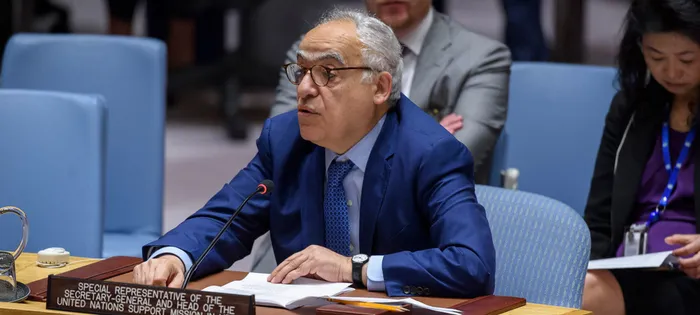UN leads talks to end fighting in Libya as 'arms embargo violated by both parties'

Ghassan Salamé, special representative of the United Nations secretary-general and head of the UN Support Mission in Libya (UNSMIL). File picture: Supplied by the UN Ghassan Salamé, special representative of the United Nations secretary-general and head of the UN Support Mission in Libya (UNSMIL). File picture: Supplied by the UN
Johannesburg - The United Nations negotiator leading talks in Switzerland to secure an end to fighting in Libya says high-ranking officials from both sides of the conflict have agreed on the need for a “permanent and lasting” ceasefire to replace an uncertain truce.
“These talks in Geneva are meant to listen carefully to the position of the two sides on what are the conditions for them to accept this translation of the truce into a permanent and lasting ceasefire," said Ghassan Salamé, special representative of the UN secretary-general and head of the UN Support Mission in Libya (UNSMIL).
The parties are meeting after months of conflict in the suburbs of Libya's capital Tripoli between the UN-recognized Government of National Accord (GNA) and the self-styled Libyan National Army (LNA), led by commander Khalifa Haftar, who laid siege to the capital last April.
Salamé warned that the chance of the situation deteriorating further persisted despite a call for a truce in early January by the presidents of Russia and Turkey.
Salamé said although both sides had accepted the truce, an international arms embargo had been broken “incessantly” since 2011, with evidence of increasing foreign interference.
“We have new evidence of new equipment but also new fighters - non-Libyan fighters - joining the two camps”, he said.
“Therefore, we believe that the arms embargo is being violated by both parties.”
In January, a joint report published by UNSMIL and the UN human rights office found that at least 287 civilians were killed and around 369 injured last year alone, with airstrikes accounting for 60 per cent of those casualties.
Despite enormous oil wealth, conflict and a blockade of key ports in eastern Libya have reduced the North African country's oil production to around 72 000 barrels a day, down from 1.3 million.
"This is a situation that is not sustainable and I would be grateful if some of the largest countries in the world who have been helping us in solving previous crises in oil production and exports do the same for this particular crisis,” Salamé said.